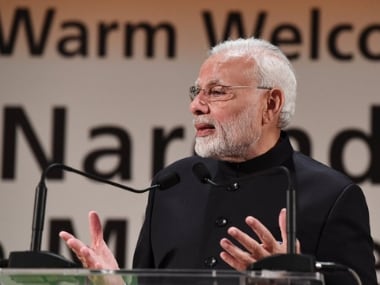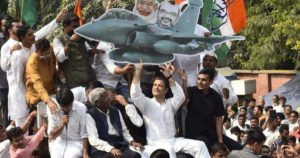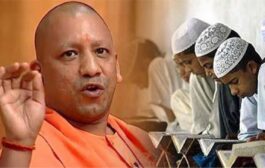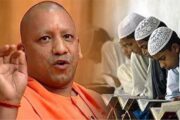On Sunday, Prime Minister Narendra Modi fired a dud while on the campaign trail in Rajasthan. In Alwar, Modi said the Congress was trying to politicise the judiciary by pressuring it to postpone hearing the Ayodhya case till after the 2019 Lok Sabha elections. This is being read as a thinly-veiled reference to the party’s ‘attempt’ to move an impeachment procedure against former Chief Justice of India Dipak Misra.
So let us examine, to begin with, some of the cases heard by benches headed by Misra in the last week of September, just before he retired. In five of the major cases heard by the Supreme Court, three went in favour of the government: In the Bhima-Koregaon arrests case, the bench refused to entertain a plea by a number of eminent people for the dismissal of the cases against five activists; in the Ayodhya case, the bench forebore from reviewing a judgment passed by an earlier Supreme Court bench, which had held that a mosque was not integral to practicing Islam; similarly, a bench did not review an earlier judgment on reservations in promotions in government jobs for Scheduled Castes and Tribes.

The Aadhaar judgment was a mixed bag: On the one hand, the bench ruled the scheme constitutional, while it disallowed the linking of the Aadhaar number with bank accounts and phone numbers. On balance, if anything, the government won.
Liberal judgments were passed in two cases: The Supreme Court struck down legal provisions making adultery a criminal offence for men but not for women; and, it allowed women between the ages of 10 and 50 — those capable of menstruating — to enter the inner sanctum of the Sabarimala temple in Kerala.
This list is not meant to impugn the Supreme Court or the benches that passed these judgments. But, with all respect, it does not paint a picture of a CJI quaking with fear at the Congress’ threat of impeachment. It is entirely possible that he understood, unlike Modi, that the gesture was symbolic and the Congress, or Opposition, did not have the numbers in Parliament to impeach him. To impeach any Supreme Court judge, each House of Parliament must pass an impeachment resolution supported by a simple majority of the total strength of the relevant House and a two-thirds majority of those present and voting.
Let’s look, on the other hand, at how Modi’s party reacted to recent Supreme Court orders and decisions. After Justice Ranjan Gogoi took over as the CJI, he made it clear that he would not pass an order on the Ayodhya case in haste. He has scheduled a hearing for early January. Fearing that a final judgment may not be passed before the 2019 Lok Sabha, the BJP, the Rashtriya Swayamsevak Sangh (RSS) and other Sangh parivar affiliates have gone into a steroid-fuelled campaign mode, evident in the massive show of strength in Ayodhya over the weekend. The univocal and infructuous demand is that the Central government must pass an ordinance or a law to enable the building of a Ram temple at the disputed site in Ayodhya, thus short-circuiting the judicial process.
The Sabarimala verdict has been seen by many, especially Hindutva hardliners as an attack on tradition and, indeed, Hinduism itself. The BJP, RSS, the temple authorities and others have thus created a huge Kerala-wide shindig to obstruct the implementation of the Supreme Court order. Up until now, no woman between the ages of 10 and 50 has been allowed to exercise her right to worship, which has been judicially underwritten, by main force.
Coming from Modi (who along with party president Amit Shah practically runs the BJP), the accusation that the Congress, or anyone else on the planet, has tried to browbeat the Supreme Court or a CJI and politicise the judiciary is risible. It is the BJP that has tried its best to subvert the judiciary and use extra-judicial means to nullify its orders.
It’s not just the judiciary that the BJP and the governments it runs have grievously undermined. They have serially undermined or subverted any number of institutions. Take the Election Commission. It announced the dates for the Himachal Pradesh elections in October last year — for November — but delayed announcing the dates for the Gujarat elections, which were finally held in December. This allowed the BJP-run Gujarat government a month’s respite to announce schemes and the party to get its campaign organised better. The elections turned out to be a closely-run affair despite this delay, with the BJP winning 99 out of 182 seats, only seven seats more than needed for a majority. The delay, thus, proved crucial.
More recently, the Election Commission delayed the announcement of dates for Assembly elections in five states — Chhattisgarh, Mizoram, Madhya Pradesh, Rajasthan and Telangana — by around three hours. By that time, Modi had addressed a rally in Rajasthan and the state’s chief minister announced a scheme for free power supply just before the dates were announced and the Model Code of Conduct came into force. Whether this was pure coincidence or whether, as the Election Commission claimed, official procedures caused the delay is left to readers to judge.
The BJP government at the Centre has also subverted various executive arms of the government — the Central Bureau of Investigation, the Income Tax Department, the Enforcement Directorate et al — to use them as a tool to harass political opponents. This can hardly be said to be a particularly new phenomenon; other governments have done the same thing before. But the particularly brazen and consistent way in which the Modi regime has gone about its work has imperilled democracy itself. Throw into the mix this government’s attempts to intimidate the media and you have a complete picture of a government that pays only token respect to constitutional norms.
Thus, for Modi to say that the Congress is guilty of any form of subversion only shows how dangerously confident the prime minister is about his patent falsehoods and autocratic ways being overlooked by the electorate and citizenry. It is to be hoped that the results of the ongoing Assembly elections will bring him and his party down several notches.
source:Firstpost.com







































